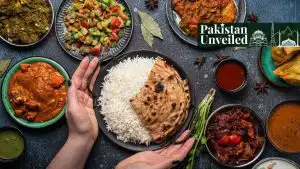Zahra Zaman is an undergraduate student majoring in International Relations at the Department of Social Sciences, SZABIST University, Karachi. She has worked as a Research Intern at the Pakistan Institute of International Affairs and has also contributed to the European Center for Populism Studies.
The bustling food streets of Pakistan once filled the air with the fragrant aromas of hearty desi cuisines, tantalising the tastebuds with rich, rustic and vibrant flavours that citizens relished with pure delight. With the rise of a fast-paced and globalised dining experience, however, they gradually began losing their essence, and a myriad of fast food franchises became dominant throughout the country.
With the advent of globalisation, Pakistan has experienced a profound cultural and economic transformation, manifesting in the exponential growth of such foreign franchises, which are now deeply entrenched in the local markets. From the American fast food chains of McDonald’s, KFC, and Dunkin Donuts to the Portuguese fast-casual restaurant chain of Nando’s, the nation is now regarded as the quintessential melting pot, embracing a globalised, diverse and cosmopolitan food culture.
The Appeal of Fast Food Culture through Cultural Globalisation: Determinants and Implications
While we have witnessed and experienced fast food culture as one of the noteworthy impacts of globalisation, there is a relatively limited discussion on what constitutes its core determinants, what factors have contributed immensely to its global rise and the ways in which the impact of this global phenomenon can be perceived. In this regard, cultural globalisation plays a pivotal role. It is the global exchange of cultural products and practices, transcending national boundaries and leading to greater interconnectedness and integration of cultures worldwide. Cultural diffusion serves as a key driver that enables the transnational flow of cultural commodities, specifically the rapid transmission of fast food culture and the emergence of global fast food chains, to facilitate this dynamic process.
Such rapid proliferation of global fast food franchises has, in turn, redefined local consumption patterns as they have gained popularity because of the quality and hygiene standards complemented by the convenience, speed, and palatable meals they offer. As these global fast food franchises exemplify the phenomenon of cultural homogenisation, they also lead to the integration of global values and norms into the local culture and traditions, blending into a unified set of cultural norms and values that are dominated by Western narratives. As a consequence, this transformation occurs at the expense of the dilution of distinct cultural identities, overshadowing local cuisines and eating habits, owing to the extensive hybridisation of traditional food culture and dining habits with fast food habits.
On the contrary, these franchises have also adapted to local tastes while introducing new flavours, contributing to glocalisation—a convergence of globalisation and localisation. As a result, such foreign brands are able to tailor their products and marketing to local preferences and consumption behaviours, demonstrating cultural sensitivity, establishing stronger connections with local audiences and maintaining a balance between global standardisation and local adaptation while reaping the benefits of consumer loyalty and market penetration. Subsequently, they have localised their menus by incorporating local flavours and ingredients. In relation to this, KFC’s menu item, Zingeratha, illustrates the concept of fusion cuisine, as it stands as a unique blend of Western and Pakistani culinary traditions and thereby caters to the local dietary habits and taste preferences, essentially.
In addition, local festivals or traditions are also being incorporated into the promotional campaigns of foreign brands. They modify their marketing initiatives in alignment with local languages and festivals in an effort to maintain their global identity while resonating with the local audience from a cultural standpoint to evoke a profound connection. During the month of Ramadan, McDonald’s offers affordable Ramadan deals and thus capitalises on the cultural significance of the holy month.
Let’s take Dunkin Donuts, for example. On the one hand, its delectable Independence Day-themed doughnuts stand as a testament to the adaptation of its products to fit local culture and traditions, localising its offerings to preserve its relevance in the markets. On the other hand, with the infusion of patriotic symbolism into the marketable item, such franchises further seek to gain commercially from the occasion of national celebrations through cultural commodification—effectively using national identity and cultural symbols while tapping into consumer sentiment and national pride to market the product and increase their sales substantially.
Moreover, as Pakistanis migrate abroad, they develop a strong liking for fast food brands. Upon returning, the Pakistani diaspora, with the largest concentrations in numerous regions such as North America or Europe, brings back a taste for food from abroad—a phenomenon explicable by the term acculturation, whereby their food choices, eating patterns and foodways are significantly altered and influenced by the host country, resulting in greater preference for Western-style foods over traditional meals. This is a dominant trend that has been observed for decades, contributing to the surging demand for foreign fast-food brands within the country.
Fast food chains operating in Pakistan also serve as vital instruments of soft power projection. The authorship of the term “Soft Power” is credited to the prominent American political scientist Joseph Nye, who defined it as the ability to obtain preferred outcomes and influence others by attraction as opposed to coercion. In practice, it is achieved when countries project their culture across borders to strengthen partnerships and goodwill, as reflected by the expansion of McDonald’s as a symbol of America’s soft power, exporting not merely fast food products but American values as well.
In 1999, Thomas Friedman opined, “No two countries that both have a McDonald’s have ever fought a war against each other.” While his “Golden Arches Theory of Conflict Prevention” is powerful, it has nonetheless proven false, time and again. Let’s stick to our own region of South Asia, for example. In 1999, both the antagonistic archrivals, India and Pakistan, fought the Kargil War over Kashmir despite each having multiple outlets of McDonald’s since the late 1990s, revealing that the theory is overly idealistic and conflict prevention remains elusive. As a matter of fact, never in my 23 years of life have we ever come close to witnessing a “McPeace” between the two historic adversaries, with the tensions only spiralling into an escalation as evinced by the recent heated stand-off, which led both states to the brink of a full-blown nuclear war.
Beyond this, an equally concerning fact is that the power and influence of American culture reflected in the acceleration of fast food chains is a mere symbol of hegemony. McDonaldisation is a term coined by the famous sociologist George Ritzer, which refers to the process whereby societal institutions adopt the principles and the model of fast food restaurants, embodying standardisation, efficiency, predictability and rationalisation, and signifying the pervasive and penetrative influence of American cultural and economic products across the globe. Consequently, this spread of American consumer culture has transpired in the transmission of American values, ideologies and lifestyles, which is corrosive to the receiver culture, and thereby, such dominance of the American consumer culture is also attributed to a form of colonialism, labelled as cultural imperialism.
In Pakistan, such a cultural shift has now led to a reconfiguration of traditional values with modern influences complemented by the inculcation of consumerist values and a stronger inclination towards adopting Western lifestyles and experiences. It is worth noting that eating at multinational franchises and being able to afford them is regarded as a “status symbol”, reinforcing class-based inequalities and the diminishing significance of traditional cuisines. While the lower classes visit cheap Pakistani restaurants and eateries, the middle and upper classes in urban areas dine in at such franchises, cultivating an air of exclusivity.
The Growth of Fast Food Culture through Economic Globalisation: Determinants and Implications
Pakistan is now embarking on the path of economic diplomacy by utilising its economic tools to advance its national goals, such as promoting trade and investment in the country. The government is seeking to create an economic environment conducive to the flourishing of franchising business models. Pakistan has even allowed foreign investors to obtain 100% ownership of certain sectors. In addition, since the state is a member of the global governance mechanism, the World Trade Organisation (WTO) has also reduced trade barriers under various binding agreements, such as the Trade Facilitation Agreement.
Currently, 70% of hotel and fast food franchises in the country are owned by American brands. These have also played an integral role in enhancing employment prospects and augmenting agricultural linkages across the country, thereby contributing to a robust economic ecosystem. In addition, the outflow of foreign exchange through repatriation of profits to parent companies is minimal, approximately 4% in the case of McDonald’s, while the remaining amount is reinvested into the local economy. With franchising experiencing rapid growth, Pakistan strives to integrate international franchises into its local economy, boost foreign direct investment (FDI), generate avenues for local employment and stimulate economic activity.
Economic globalisation has facilitated the integration of foreign fast food franchises and granted them greater access to the local market through growing interdependence between global economies. These franchises are not immune to the repercussions of this phenomenon, owing to supply chain vulnerabilities, trade policies, currency fluctuations, import restrictions, and, more importantly, the logistical and financial realities of the local environments in which they operate. McDonald’s is operated by the Lakson Group, and the Cupola Group operates KFC. While McDonald’s and KFC have localised their supply chains and sourcing to a considerable extent by partnering with local farms and food processing companies, it stands to reason that they are simultaneously exposed to domestic economic constraints such as inflation and currency fluctuations, regardless of developing resilience and cost-efficient methods in the face of global economic disruptions.
As a capitalist-oriented mechanism drives the operations of foreign fast food franchises and transnational corporations, they sustain production chains and maximise profits through the optimisation of cheap labour. As the local governments demonstrate strict adherence to the global principles of trade liberalisation, favouring the global fast food franchises to secure economic benefits, equitable policy-making and decision-making autonomy are abridged. Local and small-scale businesses, particularly traditional vendors, have borne the brunt of their emergence in the country owing to declining foot traffic and profit margins. While multinational corporations and consumers have enjoyed the benefits of the rise of fast food culture in Pakistan, small local businesses and low-income communities have become more susceptible and have been hit hardest by the financial fallout caused by these outlets, superseding and supplanting their positions in the markets, and reflecting a deeply embedded power asymmetry and marginalisation of local stakeholders, additionally.
With the passage of time, nonetheless, emerging local food businesses have also now swiftly adapted to the varying palates and tastes of Pakistanis by offering local brands of foreign foods, such as pizza, burgers, etc, in response to the increasing competition. Amongst a multitude of outlets, the most renowned ones include California Pizza, Broadway Pizza, and Mr Burger, all of which offer cheaper, affordable alternatives to the relatively expensive foreign fast food franchises, while a few, like Happy Donuts, offer a variety of flavour profiles in comparison to various doughnut shops that supplements its competitiveness in the market.
Conclusion
Globalisation through fast food culture has proven both a blessing and a curse for Pakistan. On the one hand, it acts as an impetus for economic progression through trade liberalisation, while on the downside, it shrinks the space for the growth of local businesses. Moreover, while it increases consumer choice with a plethora of fast food options, it erodes the essence of local culinary traditions and cultural diversity. The way forward is to ensure effective governance and implement regulatory frameworks to mitigate the ripple effects of fast food culture by confronting the economic, social, and cultural exigencies involved and by striking a balance between global integration and local empowerment.
If you want to submit your articles and/or research papers, please visit the Submissions page.
To stay updated with the latest jobs, CSS news, internships, scholarships, and current affairs articles, join our Community Forum!
The views and opinions expressed in this article/paper are the author’s own and do not necessarily reflect the editorial position of Paradigm Shift.






